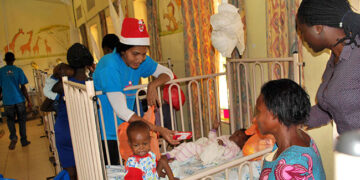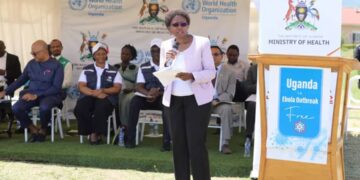The Ministry of Health has reaffirmed its commitment to ensuring that every pregnancy in Uganda is safe and that no mother or newborn dies from preventable causes. This was revealed by Dr. Charles Olaro, Director General of Health Services, during a media briefing ahead of the Safe Motherhood Conference.
Dr. Olaro said Uganda has made significant progress in maternal and newborn health, with antenatal attendance now standing at 97 percent — a sign that nearly all expectant mothers make contact with health facilities during pregnancy. He noted, however, that only 68 percent complete all four recommended antenatal visits, largely due to mothers starting care late.
“Every preventable death is one too many. Safe motherhood is a shared national responsibility,” Dr. Olaro said, calling on all Ugandans to become ambassadors for maternal health.
He emphasized that the government continues to invest in infrastructure, medical equipment, and human resources to handle the country’s 1.6 million annual deliveries. He also highlighted that safe motherhood extends beyond the health sector — involving education, gender, agriculture, water, and ICT.
Dr. Olaro underscored the importance of keeping girls in school to curb early pregnancies, empowering women economically, and addressing gender-based violence. He added that good nutrition and access to safe water remain essential to maternal well-being.
The Director General further called on the media to play an active role in raising awareness about safe motherhood. He commended journalists for their continued coverage and urged them to sustain efforts that inspire community-driven solutions.
The upcoming Safe Motherhood Conference, he said, will review progress, share innovations, and recognize individuals and organizations that have gone the extra mile in promoting maternal and newborn health. The goal is to accelerate efforts toward achieving a maternal mortality ratio of 70 deaths per 100,000 live births, in line with the Sustainable Development Goals.
Dr. Olaro concluded by reaffirming the Ministry’s commitment to leadership, coordination, and accountability in advancing the safe motherhood agenda.
“We look forward to a future where every pregnancy is wanted, every birth is safe, and every mother and newborn thrives,” he said.
Dr. Mugahi Richard, commissioner ministery of health in charge of reproduction and infant health has emphasized the critical importance of postpartum health screening, calling it a vital step in safeguarding the wellbeing of both mothers and their newborns.
Speaking recently, Dr. Mugahi highlighted that every mother who delivers in a government health facility should attend three essential postpartum visits: six hours, six days, and six weeks after delivery. These visits are designed not only to monitor physical recovery but also to identify potential health issues early.
“Postpartum visits are more than routine check-ups. They are opportunities to screen for mental health challenges, especially postpartum depression, as well as physical conditions such as high blood pressure and eclampsia,” Dr. Mugahi explained.
The six-week postpartum visit, he noted, is particularly crucial as it coincides with a child’s first immunizations, ensuring both mother and baby receive comprehensive care.
Dr. Mugahi also drew attention to the growing prevalence of sickle cell disease in Uganda, describing it as an emerging public health concern. He reassured the public that screening facilities for sickle cell disease are available at health centers and general hospitals, along with support packages to assist affected mothers and babies.
“Early detection saves lives. Our health facilities are equipped to help mothers and children through every step of the postpartum period,” Dr. Mugahi said.






































